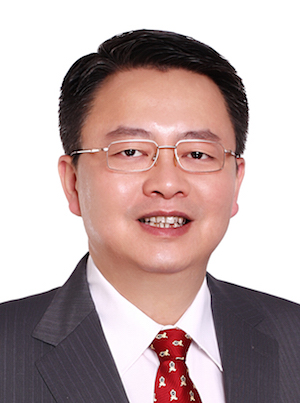 Yang Qin
Yang Qin
Vice Chairman
Customs and Trade Facilitation Commission
China National Committee, ICC
Public Finance Program [Customs] (’99)
Please tell us about your career path so far. What is your area of specialization and how did you come to work in this area?
Before entering the private sector, after graduation from the Shanghai Customs College in 1995, I worked in the Customs General Administration (CGA) firstly as a project coordinator, and then as a senior expert of customs administration where I played important roles in a number of major China Customs modernization projects, including the China-US Shanghai Demonstration Port Project under the APEC framework, the nationwide China Customs Modernization Project (Phase II), the China Customs Container Security Initiatives (CSI) Implementation Project, and the US-China Customs Modernization Project under the frameworks of both the World Trade Organization (WTO) and the US Trade Development Agency (USTDA).
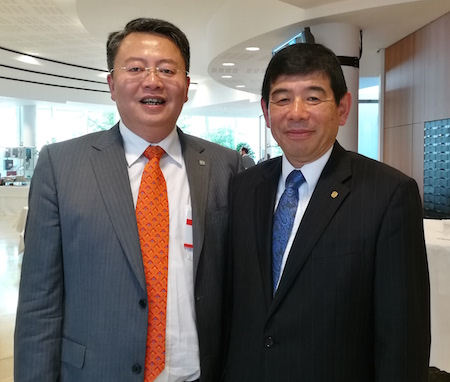
Yang Qin with Mr. Kunio Mikuriya, Secretary General of the World Customs Organization
Between 2012 and 2014, I worked in the Regional Intelligence Liaison Office for Asia and the Pacific, World Customs Organization as an intelligence liaison officer based in Tokyo, Japan where I finalized several large-scale cigarette and Intellectual Property Rights (IPR) infringement trafficking seizures through effective international intelligence cooperation for which I have been awarded for excellent performance by the WCO. I have also been dispatched to work in Tibet for three years during my career in the public sector, which has given me better insights into the development in areas of ethnic minorities.
In 2006, I started initiatives in the private sector by establishing and heading CC International Consulting Limited, which is now in the transition from the leading customs and trade consulting firm in China to a high-end, full-range service-provider for foreign giant enterprises operating in China and for Chinese enterprises going abroad.
Till now, altogether I have been working in the field of customs and trade for more than 25 years. I was initially a customs official but I am now acting as an advocator, promoter and facilitator of customs modernization and trade facilitation in China. In March 2015, I was nominated by the China Council for the Promotion of International Trade (CCPIT), an inter-ministerial trade promotion body, as one of the twenty-four Expert Committee Members as an expert in the field of trade facilitation and customs modernization. It is a remarkable transition in my life – doing the same type of work in both the public and private sector with different standpoints and perspectives.
You are the founder and Executive Director of “CC International Consulting Limited”. Please tell us about your company and its activities.
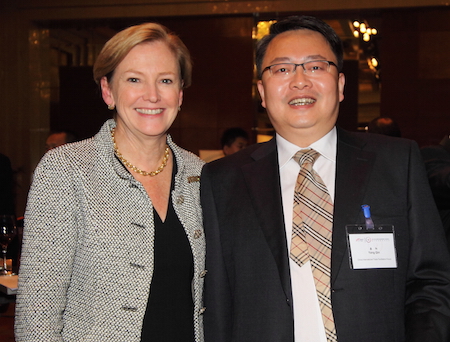
Yang Qin with the then Global CEO of Dupont, Ellen Kullman
CC International Consulting Limited is another “son” in my life and it is now serving many top Fortune 500 companies operating in China with their significant legal, policy and government affairs issues by providing both advisory services and real-world business solutions. Many global giant companies including Samsung from Korea, DuPont from America and Panasonic from Japan etcetera are among the major clients of CC International Consulting Limited. Over the past ten years we have developed a track record on issues and crisis management as well as government relations on behalf of clients. Our accomplishments have resulted in significant challenges to China’s trade and investment legislations and policies with continuous successful records on behalf of our clients.
Simultaneously we are also providing modernization-related services to central government agencies, including the Ministry of Commerce, Ministry of Finance, Customs General Administration and other major provincial governments in Jiangsu, Shandong and Guangdong provinces. For example, in 2013 and 2014, we successfully helped China Customs to introduce the WCO’s CLiKC online training platform, which has become a nationwide professional training tool for China Customs officials.
You are also involved in “China International Trade Facilitation Forum” Please tell us about the Forum and your role in it.
In 2012, realizing that global trade had been in a deep recession while international trade facilitation would become an important new “engine” for trade development and social prosperity, I initiated “China International Trade Facilitation Forum” together with Mr. Yu Ping, Vice President of the China Council for the Promotion of International Trade (CCPIT) and Mr. Ye Jian, President of the China Association of Ports-of-Entry (CAOP), to promote WTO’s international trade facilitation initiatives in China. This forum is now a national regular trade promotion platform and was approved by the State Council in 2013. Supporting ministries of “China International Trade Facilitation Forum” include the Ministry of Commerce (MOFCOM), Ministry of Transportation, Customs General Administration (CGA), General Administration of Quality Supervision, Commodity Inspection and Quarantine (AQSIQ), State Taxation Bureau and State Administration of Foreign Exchange.
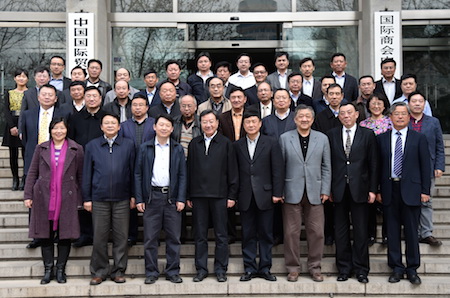
Expert Committee of the China Council for the Promotion of International Trade (CCPIT)
In 2014, “China International Trade Facilitation Forum” was awarded, among 192 nominations, the Special Top Award for National Image Transmission during the selection of the China Golden Awards for Excellence in Public Relations organized by the China International Public Relation Association, Ministry of Foreign Affairs.
Acting as the Secretary General of this Forum, in 2012, 2013, 2014 and 2015, my colleagues and I have successfully hosted and organized the “China International Trade Facilitation Forum” for four consecutive years and expanded it to other trade-concentrated regions in China, including “China (Lianyungang) International Trade Facilitation Forum” during “China Lianyungang International Logistics Expo” in September 2014 in Jiangsu Province, “East Asia Trade and Investment Facilitation Forum” during the “China-Japan-Korea Industrial Expo” in September 2015 and 2016 in Shandong Province and the “Sixth World Business Leaders Conference” during the “2016 China Imported Products Expo” in May, 2016 in Jiangsu Province.
I am very happy and proud that even though I am working now in the private sector I can still be widely recognized as an important pioneer, promoter, and facilitator for international trade facilitation in China.
And you have been appointed as Vice-Chairman of the newly launched Customs and Trade Facilitation Commission of the China National Committee, International Chamber of Commerce (ICC). Please tell us about this new platform and your responsibilities as Vice Chairman.
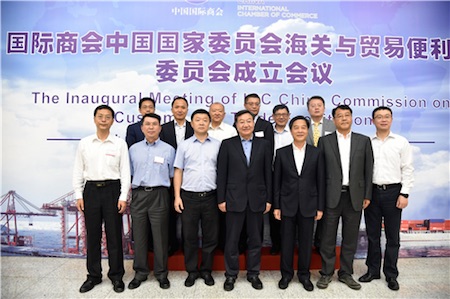
Inauguration Ceremony of the Customs and Trade Facilitation Commission, ICC
International Chamber of Commerce (ICC), established in 1919, is the biggest world business organization with various initiatives to promote global trade and improve the international business climate. ICC China, represented by the China Chamber of International Commerce (CCOIC) is a national committee of ICC comprising leading companies and business associations to shape ICC policies and alert the government to international business concerns.
In June 2016, I was elected and appointed as the Vice-Chairman of the Customs and Trade Facilitation Commission of the China National Committee, International Chamber of Commerce (ICC). My current responsibilities include: (1) the involvement of the formulation of international trade rules, standards and best practices, (2) the promotion of the implementation of international trade rules, standards and best practices in China domestically, (3) the organization of major trade and investment related exhibitions and events, (4) the enhancement of customs modernization and trade promotion efforts in China, (5) the assistance to leading member companies and business associations with their significant legislation and policy issues. This is a completely new challenge in my career and I am trying best to catch up.
In your current capacity, what do you see as the main opportunities and challenges for China over the course of the next five to ten years?
China is now in the process of transitions and personally I believe market economy, rule by law and democracy will be the most important cornerstones for future development. These three are both opportunities and challenges the Chinese government and her people are facing and a rational, systematic, comprehensive and incremental approach is highly suggested. That is easier said than done though and it may need even longer time while good government is a must in a very stable environment of opening-up.
Simultaneously, China needs to maintain constructive diplomatic relations with its neighboring countries, especially Japan and Korea, based on mutual trust, mutual respect, mutual understanding and mutual support to contribute to the regional and global peace, development and prosperity.
What are some of the biggest challenges you face in your work? And what have been the most interesting or rewarding aspects of your career thus far?
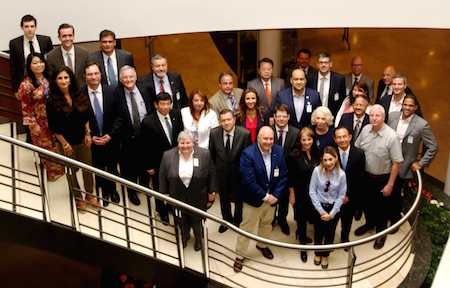
Private Sector Consultative Group, World Customs Organization
Till now the biggest challenge in my work is that I always feel my expertise, knowledge, skills and experiences are limited and I have to keep on learning continuously. It is natural since life is a process of continuous learning and life-long learning style is important to everybody in this fast-changing society. I am positive and I am getting used to learn from books and from everybody I meet in my work and life. I have been appointed as the visiting professor and off-campus advisor for master’s programs by two top universities in China – University of International Business and Economics (UIBE) and Capital University of Economics and Business. I am trying my best to spread knowledge and cultivate students through continuous learning and working.
The most rewarding aspect in my career is that the more I contribute, the more I harvest and there is always a positive relation between the two. To this extent, I think I am lucky enough.
What led you to GRIPS? What was the most important thing you learned while here, and how has your experience at GRIPS prepared you for future endeavours?
In September 1999, I was awarded a Customs Human Resources Development Scholarship by both UNCTAD (United Nations Conference on Trade and Development) and WCO (World Customs Organization). Being given the opportunity to study at GRIPS/GSPS has been a new changing point in my life. Also through the two-year study in GRIPS/GSPS, I gained not only advanced management concepts, thinking methods and working skills but also global visions, international networks which have helped to change my life significantly and provide me with very important and solid foundations for my future endeavors.
How do you maintain a balance between your work and the rest of your life? And what is your favorite thing to do when you are not working?
To be frank and honest, even till now I can’t maintain a very good balance between my work and my life since almost every day I need to devote my time more to work than to “life”. It is not easy to maintain a careful balance between life and work for people who work 14 to 15 hours a day but after realizing the importance of the balance, I am starting to devode more time to things outside work.
In my limited spare time, I prefer reading, watching movies, playing golf and especially playing with my kids – I am living with my wife, my son – Andrew and my daughter – Helena. Sometimes we separate from each other, but we all value the time we spend together.
What are some of your fondest memories of your time spent at GRIPS? And what do you miss about Japan?
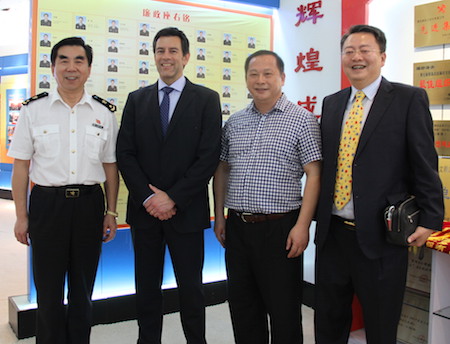
Visiting Local Customs with the World Customs Organization
GRIPS/GSPS has given us a lot of the fondest and dearest memories including friendships between and among fellow alumni from different countries and regions in a multi-cultural environment, direct exposures to the original and friendly Japanese society and her people, various social events like field trips, hanabi taikai (fireworks), hanami (cherry blossom) and onsen (hot springs). Especially I miss the food in a very old and traditional restaurant named “SERYNA”, serving very good Kobe beef and hairy crab since 1961 in the Roppongi area.
If you could give one piece of advice to anyone considering studying at GRIPS what would it be?
Besides studies and research, try your best to broaden your international visions and maintain long-term constructive relationships with fellow alumni, professors and those Japanese officials and entrepreneurs you might meet.
How would you like to maintain involved with the School? What do you expect from GRIPS as an alumnus and o you have any suggestions on how to further utilize the GRIPS alumni network?
After graduation, I have been maintaining regular contacts with professors, administrative staffs and schoolmates of GRIPS/GSPS. Sometimes there are visitors from GRIPS/GSPS networks to Beijing and those are the happiest time for our fellow alumni to get together for a reunion. For many of us, alumni, GRIPS/GSPS has played an important role in our lives and I sincerely hope GRIPS/GSPS can provide us with updated information, enhanced relationships and expanded career development opportunities. Especially I suggest GRIPS/GSPS to establish and expand national alumni associations in various countries for friendships and interconnections.





